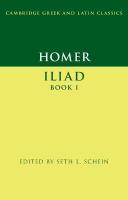
CUP (2022) p/b 242pp £19.99 ISBN 9781108412964)
Any addition to Cambridge’s fine ‘Green-and-Yellow’ series of commentaries is an event to be welcomed, particularly when its author is a scholar of S.’s eminence. Now emeritus, he draws on a lifetime study of Homer; his The Mortal Hero (1984) is still one of the best introductions to the Iliad.
S. copes smoothly with the challenges facing an editor of this crucial book: how to pick out what he needs to highlight from the vast range of Homeric scholarship and compress it into the limited pages offered by a standard series, at one and the same time providing an introduction to undergraduate and postgraduate students and retaining the interest of ‘scholars and even … specialists in Homeric epic’. And all this on a text that is both possibly the poem’s most frequently studied single book and also programmatic of the complete poem.
S.’s introduction first looks at the Iliad as a whole, dealing judiciously with such familiar matters as its poetic and historical tradition, its probable composition date and use of writing, and there is a good though necessarily brief section on the balancing structure of Books 1-3 and 22-24. His footnotes quote generously from other scholars. When he moves on to Book 1 there is a not unexpected emphasis on Achilles, mortality, and honour, and very good it is. Some readers may find the space here devoted to interpretation of l.5 (‘And the plan of Zeus was [being] fulfilled’) surprising, as it is later developed at length in the commentary; and at the prominence given to the minority view (with the relevant Cypria passage quoted in full) that Zeus wished to relieve the Earth’s population burden (a story that ‘many in Homer’s earliest audiences … might well have associated’ with this line). Fulfilling his promise made to Thetis in the poem seems a more likely reference.
S.’s philological bent shows in his sections on language and metre: roughly twice the length that his closest Iliad 1 competitor (Simon Pulleyn, OUP 2000) gives it—and S. includes seven pages on the history of Parry’s doctrine of formulas. Narrative and speeches get four.
It is on this last point that students new or newish to Homer, surely the majority of this commentary’s users, will look for greater guidance. S.’s commentary is as one might expect full of helpful information and explanation, but there is a strongly linguistic colour throughout. Here, for example, is his comment on the fourth and fifth words of the book.
‘Peleiadeo Akhileos, with synizesis of the e and o and hiatus between the two words … occurs 6x in the Il. at the end of the line. Peleiadeo is the genitive of the first-declension masculine nominative Peleiades. The older form of the genitive was Peleiadao … but at a relatively late stage of the oral poetic tradition -ao became -eo by Ionic quantitative metathesis …Peleiada’ Akhileos would scan here but is not found anywhere in the MSS of Homeric epic.’
This is perhaps an extreme example, but it is complemented in many places by missed opportunities to lift language off the page, for example by attention to particles or word order. In one short passage (lines 173-178) two instances of ge and especially one of pou cry out for comment. One of the delights of Homer is the way he suggests tone, gesture, and emotion in his heroes’ speeches, colouring formal utterance (here Agamemnon’s angry public response to Achilles) with the ebb and flow of everyday conversation—or at any rate what sounds like it. That pou tells us a lot about Agamemnon.
The comments above admittedly focus on the use of S.’s commentary by undergraduates; and there will always be one or two students in a class at this level with the enthusiasm and doggedness to dive deeper into traditional classical scholarship, where further joys await them. But in these times, when fewer students can rely on the luxury of five years of formal Greek training behind them, there must also be a strong case for helping them to relish the richness and complexity of Homer’s storytelling. Browning’s grammarian may have revelled in ‘settling Hoti’s business .. and the enclitic De’, but there is more to classical literature than that. Homeric apprentices would do well to supplement S. with Pulleyn, who keeps his technical discussions penned inside avoidable square brackets.
Anthony Verity
